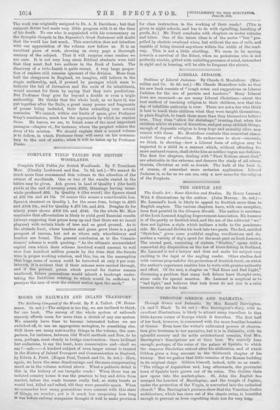BOOKS ON RAILWAYS AND INLAND TRANSPORT.
The Railway Conquest:of the World. By F. A. Talbot. (W. Heine- mann. 6s. net.)—The subject is too big, we are inclined to think, for one book. The survey of the whole system of railroads scarcely affords room for more than a sketch of any one system. We scarcely have time to become interested before we are switched off, to use an appropriate metaphor, to something else. Still there are ninny noteworthy things in the volume, the com- parison, for instance, between Old World methods and New, to be seen, perhaps, most clearly in bridge construction: there brilliant but audacious, to say the least; here conservative and—shall we say ?—safe.—A kindred subject of even larger extent is treated in the History of Inland Transport and Communication in England, by Edwin A. Pratt. (Kogan Paul, Trench and Co. Os. not.)—Here, again, we have the same disadvantage and the same compensating merit as in the volume noticed above. What a pathetic detail is this in the history of our turnpike roads ! When there was an isolated country house it was the practice to buy and drive from market, before the roads became really bad, as matty beasts as would last, killed and salted, till they were passable again. When we remember how many generations were content with this state of things, we wonder ; yet is it much less surprising how long it was before railway companies thought it well to make provision
for class instruction in the working of their roads? (This is given in night schools, and has to do with signalling, handling of goods, &a) Mr. Pratt concludes with chapters on motor vehicles and tubes. One of the latest ideas is of the motor "bus" pro- pelled by electric overhead wires, but without the use of rails, and capable of being steered anywhere within the width of the road- way. This is not a little startling. We seem to be moving towards a survival of the fittest, when no pedestrian who is not perfectly nimble, gifted with unfailing presence of mind, untouched in sight and in hearing, will be able to frequent the streets.






















































 Previous page
Previous page